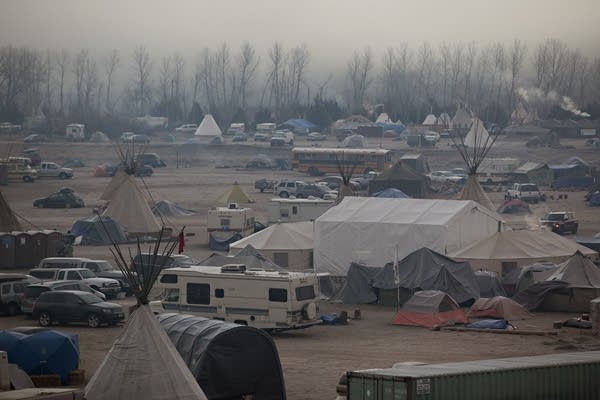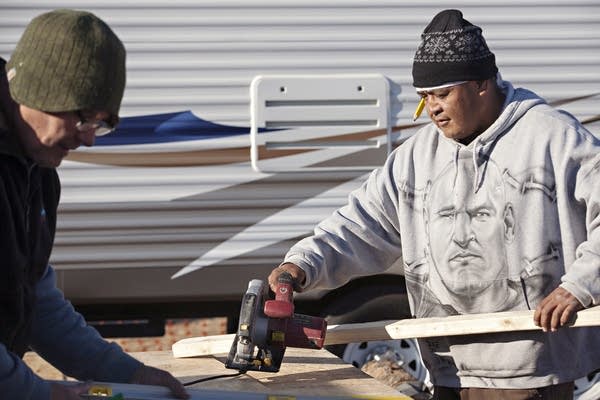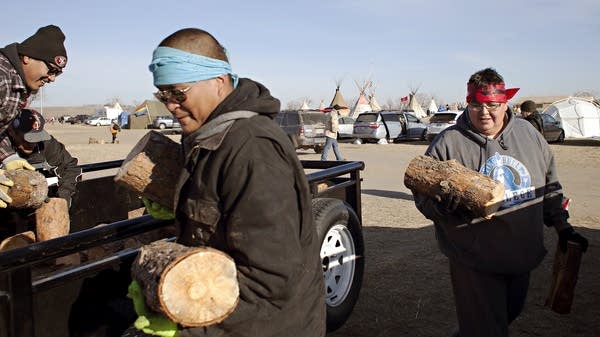As winter settles in, so do Dakota Access pipeline protesters

Go Deeper.
Create an account or log in to save stories.
Like this?
Thanks for liking this story! We have added it to a list of your favorite stories.
A few thousand people populate an encampment about a half mile from the bridge where protesters faced off with police Sunday.
Wood smoke hangs thick in the air from camp fires people use to stay warm, everything is coated with the dust from ground beaten bare by thousands of feet.
Over the weekend, a stiff breeze and temperatures ranging from 10 to 30 degrees brought a strong hint of winter to the camp 40 miles south of Bismarck, N.D. But that doesn't mean the activists protesting the Dakota Access oil pipeline are going anywhere soon.

Their camp spreads over more than a half mile with several thousand people living in everything from insulated yurts to flimsy summer tents.
Turn Up Your Support
MPR News helps you turn down the noise and build shared understanding. Turn up your support for this public resource and keep trusted journalism accessible to all.
Near the middle of the camp a Red Lake Nation flag flies inside a small compound with tents, fish houses and traditional tipis.
"Out here it's just prairie, so the wind definitely will kick your butt out here, so we're building wood structures," explained Stuart Perkins, a Red Lake Band member from Minneapolis.
Perkins arrived at the camp Oct. 26. He was haunted by the pictures of protesters being attacked by dogs several weeks ago near the camp, he said.

"I've been obsessing about it since, like I needed to be here, the water's in danger," he said. "This is not just a tribal thing, it's a human thing."
Nearby, men split logs for firewood as a surveillance helicopter circles overhead.

People from several states are working together to build a wood frame bunkhouse that will sleep 48. It's built from 2x4s, and 4x8 wood panels. Styrofoam insulation inside will help hold the heat from wood stoves.
The leader of this camp is Tito Ybarra, a Red Lake tribal member who lives in Bemidji. He's been a stand up comic since 2010, but quit to come to the camp about three months ago.
Ybarra says he's doing whatever he can to support the camp. "I don't know for how long I'll be able to keep that up. But I'm going to do my best," he said. "I miss my family."
Helping this mostly American Indian group is Frank Sander, a guy who describes himself as a German from Knife River, Minn. Sander is retired, and he's been here 10 days helping build winter quarters.

"I saw on Facebook some of the Native Americans were standing up to their waists in the water and getting maced," Sander said. "I thought if they can get maced, I can drive 10 hours to support them."
The support means a lot to Perkins, who says on this windswept prairie, he's had something of an epiphany about race relations.
"Out here you see people in a different light," he said. "It's like you're out here with us risking your life. You get past that the first, second day. That's over with."

Ybarra says being at the camp and watching strangers help each other without question has made him rethink his entire existence. As a standup comic, he said, he was mostly thinking about himself and having a good time.
"I've never been a good representative of my tribe. I never really knew what that meant, I didn't really care what it meant," he said. "But now being out here, people are watching. Are they going to say there's that drunk Red Laker? Or are they going to say damn that Red Lake boy, he works hard doing what he can for the people."
Ybarra is committed to the camp until the end, he said — however it ends.
Perkins said he's certain this camp has started something important, even though he's not sure about the odds of stopping the Dakota Access pipeline.

"The odds were against me the day I was born. I'm native, this is business as usual for us," Perkins said. "Do I think we can beat them? Yes, in the long run, yes.
"Do I think we can stop the pipeline? That's a different story. We've already won. By creating this conversation that the world's been waiting for."
Correction (Nov. 22, 2016): Frank Sander's name was misspelled in an earlier version of this story.



